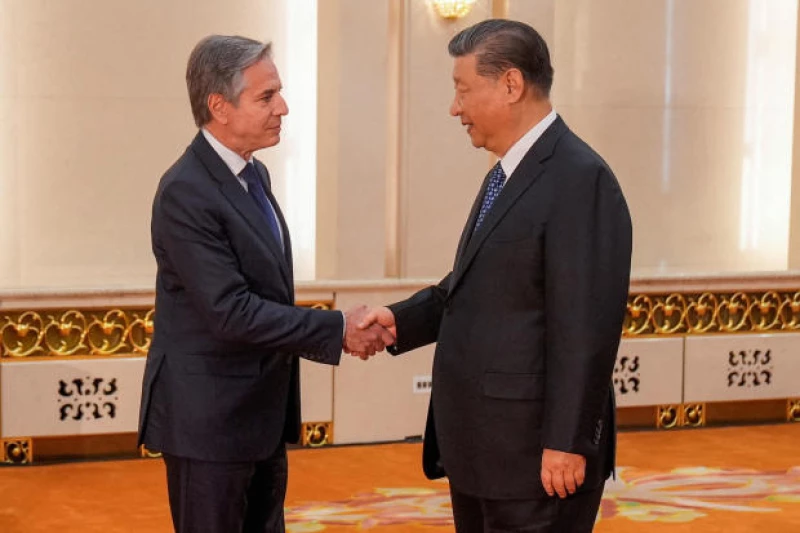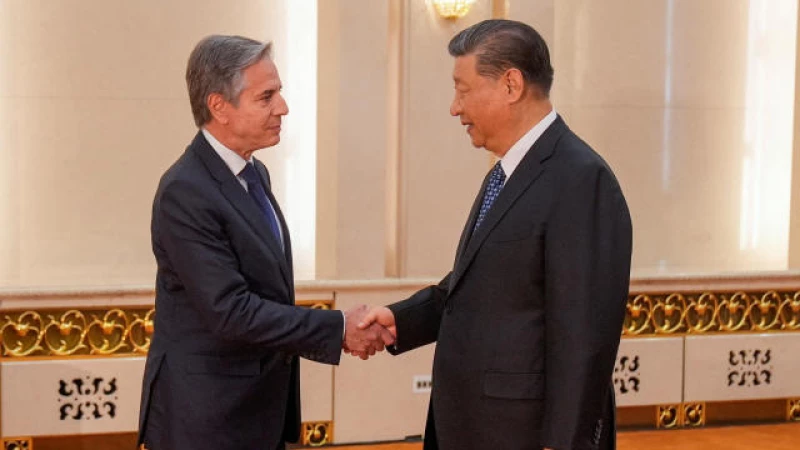Beijing — U.S. Secretary of State Antony Blinken met Friday with Chinese President Xi Jinping and senior Chinese officials, warning of the dangers of misunderstandings and miscalculations as the United States and China butted heads over a number of contentious bilateral, regional and global issues. Blinken met with Xi in Beijing after holding talks with Chinese Foreign Minister Wang Yi and Public Security Minister Wang Xiaohong.
Talks between the two sides have increased in recent months, even as differences have grown.
"We are committed to maintaining and strengthening lines of communication between us," so that the two sides can prevent any "any miscommunications, any misperceptions and any miscalculations," Blinken said.

Earlier, Blinken and Wang also underscored the importance of keeping lines of communication open as they lamented persistent and deepening divisions that threaten global security. Those divisions were highlighted earlier this week when President Biden signed a massive foreign aid bill that contains several elements the Chinese see as problematic.
Their comments hinted at a long list of differences to be discussed, including Taiwan and the South China Sea, trade and human rights, China's support for Russia and the production and export of synthetic opioid precursors.
- Tensions Rise Between U.S., China, and Russia Over Tiny Technological Advancement
"The relationship between China and the U.S. is showing signs of stabilization," Wang informed Blinken during their 5 1/2 hours of discussions. "However, there is a noticeable increase in negative aspects affecting the relationship, leading to various disruptions."
"The crucial question is whether China and the United States will continue to progress positively or revert to a downward spiral," Wang pondered. "This is a pivotal issue for both countries, testing our sincerity and capabilities."
"China's justified development rights have been unfairly suppressed, and our fundamental interests are under threat," he emphasized. "Our concerns remain consistent. We consistently advocate for mutual respect of core interests and urge the United States to refrain from interfering in China's internal matters, impeding China's growth, or crossing China's boundaries concerning sovereignty, security, and development interests."
In response, Blinken underscored the Biden administration's commitment to engaging in dialogue with China, even on contentious topics. While acknowledging some progress over the past year, he anticipated that discussions would remain challenging.
"I anticipate these conversations to be candid and forthright regarding our areas of disagreement and the stance of the United States. I am confident that you will do the same on behalf of China," Blinken assured Wang.
In a world where face-to-face diplomacy is considered irreplaceable, efforts to move forward and address differences are crucial. This sentiment was echoed as the State Department highlighted the importance of clear communication to prevent misunderstandings and miscalculations.
Following in-depth discussions, Secretary of State Blinken and Chinese Foreign Minister Wang engaged in substantive talks that touched on areas of disagreement and potential cooperation. Blinken reiterated U.S. concerns, emphasizing the nation's commitment to upholding its interests, values, and those of its allies and partners, particularly on issues related to human rights and the economy.
Secretary Blinken's visit to China coincided with President Biden signing a $95 billion foreign aid package, a move that includes provisions aimed at countering China's assertiveness towards Taiwan and in the South China Sea. Additionally, the package includes measures to compel the China-based parent company of TikTok to divest from the social media platform.
As major players in the Indo-Pacific region, China and the United States have been at odds over various issues, with Washington expressing growing concerns over Beijing's aggressive actions towards Taiwan and neighboring countries in the South China Sea.
China has criticized U.S. aid to Taiwan and swiftly denounced it as a dangerous provocation. It also vehemently opposes attempts to compel the sale of TikTok.
The legislation also allocates $61 billion to Ukraine for self-defense against Russia's invasion. The Biden administration has vocally expressed concerns that China's support for Russia's military-industrial sector has enabled Moscow to evade western sanctions and intensify attacks on Ukraine.
U.S. officials have indicated that China's relationship with Russia would be a key topic of discussion during Blinken's visit. Just before the start of Friday's meetings, Russian President Vladimir Putin announced his upcoming visit to China in May.







